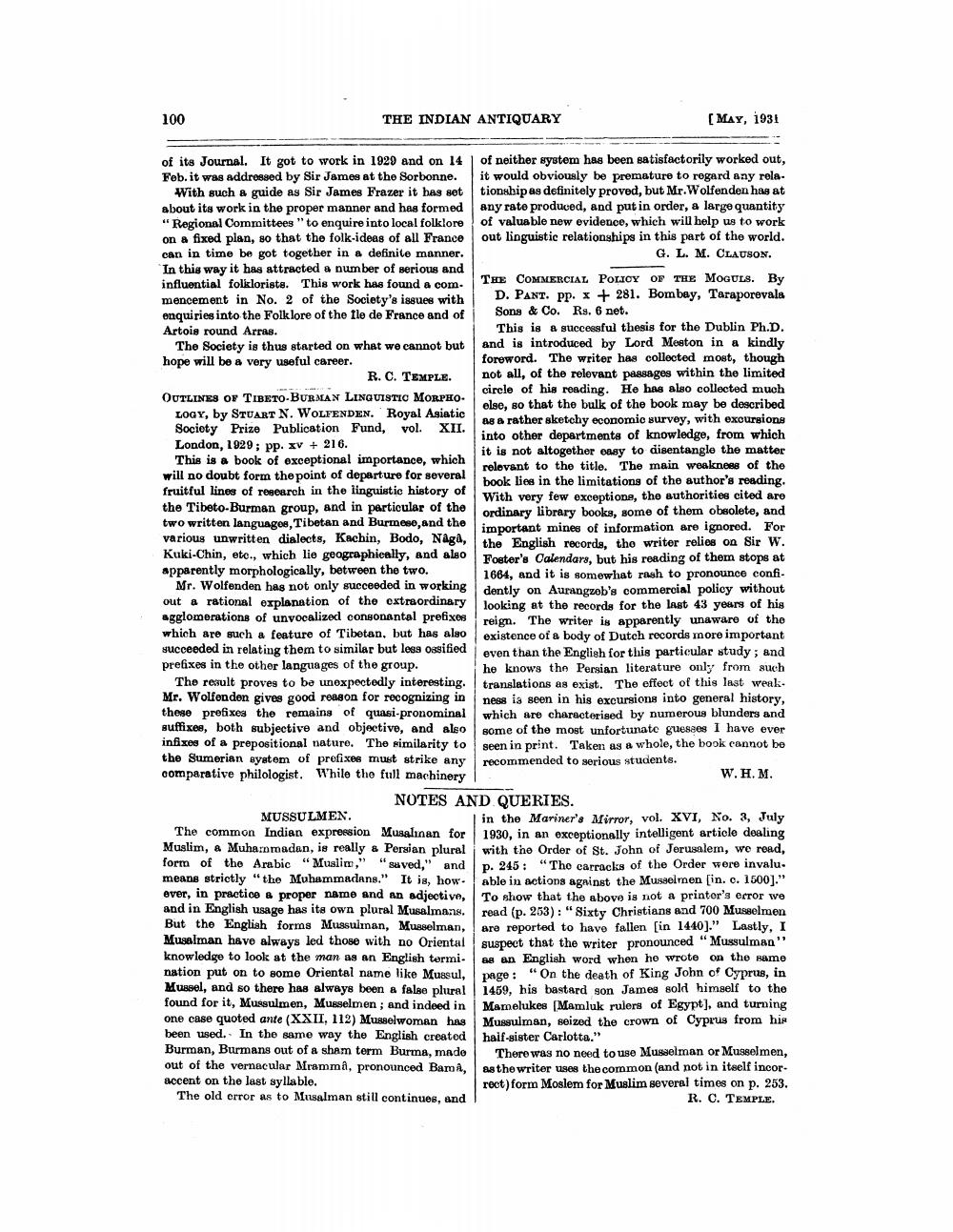________________
100
THE INDIAN ANTIQUARY
[MAY, 1931
of its Journal. It got to work in 1920 and on 14 of neither system has been satisfactorily worked out, Feb. it was addressed by Sir James at the Sorbonne. it would obviously be premature to rogard any rela
With such a guide as Sir James Frazer it has set tionship as definitely proved, but Mr. Wolfenden has at about its work in the proper manner and has formed any rato produced, and put in order, a large quantity "Regional Committees "to enquire into local folklore of valuable new evidence, which will help us to work on a fixed plan, so that the folk-ideas of all France out linguistic relationships in this part of the world. can in time be got together in a definite manner.
G. L. M. CLAUSON. In this way it has attracted a number of serious and influential folklorists. This work has found a com.
THE COMMERCIAL POLICY OF THE MOGULs. By mencement in No. 2 of the Society's issues with D. PANT. PP. X + 281. Bombay, Taraporovala enquiries into the Folklore of the fle de France and of i Sons & Co. Rs. 6 net. Artois round Arras.
This is a successful thesis for the Dublin Ph.D. The Society is thus started on what we cannot but and is introduced by Lord Meeton in a kindly hope will be a very useful career.
foreword. The writer has collected most, though R.C. TEMPLE
not all, of the relevant passages within the limited
circle of his reading. He has also collected much OUTLINES OF TIBETO-BURMAN LINGUISTIC MORPHO.
else, so that the bulk of the book may be described LOGY, by STUART N. WOLFENDEN. Royal Asiatic
as a rather sketchy economic survey, with excursions Society Prize Publication Fund, vol. XII.
into other departments of knowledge, from which London, 1929; pp. xv + 216.
it is not altogether casy to disentanglo the matter This is a book of exceptional importance, which
relevant to the title. The main weakness of the will no doubt form the point of departure for several
book lies in the limitations of the author's reading. fruitful lines of research in the linguistic history of
With very few exceptione, the authorities cited are the Tibeto-Burman group, and in particular of the
ordinary library books, some of them obsolete, and two written languagee, Tibetan and Burmese, and the
important mines of information are ignored. For various unwritten dialects, Kachin, Bodo, Naga, the English records, tho writer relies on Sir W. Kuki-Chin, etc., which lie geographically, and also
Foster's Calendars, but his reading of them stops at apparently morphologically, between the two.
1664, and it is somewhat rash to pronounce confi. Mr. Wolfenden has not only succeeded in working
Bing
dantly on Auran
dently on Aurangzeb's commercial policy without out a rational explanation of the extraordinary looking at the records for the last 43 years of his agglomerations of unvocalized consonantal prefixos reign. The writer is apparently unaware of the which are such a feature of Tibetan, but has also existence of a body of Dutch records more important succeeded in relating them to similar but less ossified
even than the English for this particular study; and prefixes in the other languages of the group.
he knows the Persian literature only from such The result proves to be unexpectedly interesting. translations as exist. The effect of this last weak. Mr. Wolfondon gives good reason for recognizing in ness is seen in his excursions into general history, these prefixes the remains of quasi-pronominal which are characterised by numerous blunders and suffixes, both subjective and objective, and also some of the most unfortunate guesees I have ever infixes of a prepositional nature. The rimilarity to seen in print. Taken as a whole, the book cannot be the Sumerian ayatom of profixes must strike any recommended to serious students. comparative philologist. While the full machinery
W.H.M. NOTES AND QUERIES. MUSSULMEN.
in the Mariner's Mirror, vol. XVI, No. 3, July The common Indian expression Musalinan for 1930, in an exceptionally intelligent article dealing Muslim, & Muharpmadan, is really & Persian plural with the Order of St. John of Jerusalem, we read, form of the Arabic "Muslim," "saved," and p. 245: “The carracks of the Order were invalu. means strictly "the Muhammadans." It is, how ! able in actions against the Musselmen [in. c. 1500]." ever, in practice a proper name and an adjective, To show that the above is not a printor's error we and in English usage has its own plural Musalmans. read (p. 253): "Sixty Christians and 700 Musselmen But the English forms Mussulman, Musselman, are reported to have fallen [in 1440)." Lastly, I Musalman have always led those with no Oriental suspect that the writer pronounced "Mussulman" knowledge to look at the man as an English termi. 88 an English word when he wrote on the same nation put on to some Oriental name like Mussul, page : "On the death of King John of Cyprus, in Museel, and so there has always been a falae plural 1459, his bastard son James sold himself to the found for it, Mussulmen, Musselmen, and indeed in | Mamelukes (Mamluk rulers of Egypt), and turning one case quoted ante (XXII, 112) Murselwoman has Mussulman, seized the crown of Cyprus from him been used. In the same way the English creatod half-sister Carlotta." Burman, Burmans out of a sham term Burma, made There was no need to use Musselman or Musselmen, out of the vernacular Mramma, pronounced Bama, as the writer uses the common (and not in itself incoraccent on the last syllable.
rect) form Moslem for Muslim several times on p. 253. The old error as to Musalman still continues, and
R. O. TEMPLE.




